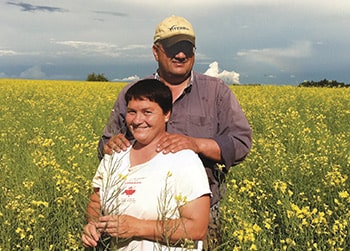Maintain positive, long-term relationships with customers by managing their expectations.
Customer satisfaction is unquestionably the goal of every retailer, regardless of the product or service he or she provides. It may seem at times that it’s out of a retailer’s control but, in fact, the opposite is true. Whether a customer is satisfied or dissatisfied with the service they’ve received often comes down to one thing – how well their retailer managed their expectations.
Managing the expectations of many customers with different wants and needs might sound like a tricky subject but, according to ag marketing consultant Justin Funk, the biggest part of the equation is communication.
Funk is a managing partner at Agri Studies Inc., a Guelph, Ont. based consulting firm that provides sales and marketing strategies and training to agribusiness professionals across the industry. He says when a customer is disappointed in the service they’ve received, it is usually because their expectations didn’t line up with what the retailer could (or was willing to) provide.
Get on the Same Page
“The best way to avoid disappointment all-around is for both sides to communicate, and the earlier in the process, the better,” he says. “If you can validate and understand what the expectations are, then you’ll be able to quickly determine if they are too high or unrealistic. I would rather establish that before anyone became disappointed.”
Funk says taking the time to learn a customer’s goals and objectives can not only prevent disappointment, but once a retailer knows what the customer is looking to achieve, they can quickly get on the same page about the level of service the customer can expect from the retailer.
Chris Schuh, general manager of Top Gro Agro in Mallaig, Alta., says that for his team, being on the same page includes being upfront about changes to service – both positive and negative – before the changes are implemented.
“If we have an increase in service, we will write to them about the improvements,” says Schuh. “At the same time, if there’s something that’s changing to the negative side, we try to give them a heads up so it’s not a surprise to them when we’re not able to provide the service.”
Level the Playing Field
Schuh says he also takes care to level the playing field, ensuring Top Gro customers receive equal treatment, regardless of the size of their operation. While some may argue that this is not strictly in a retailer’s best interest financially, he says it helps him sleep at night and eliminates the need to backtrack if he knows that customers of all sizes have been offered the same service and pricing.
“A lot of big farms will pre-pay their fertilizer out of season, so maybe they’ll get a little bit different treatment because they’re buying at that time of year; but if a smaller guy walks through the door at the same time, they get treated the same as the big guys,” Schuh explains. “Our customers all sit at the same coffee shop, so if they’re all getting consistent service, then hopefully they’re spreading a consistent message for us and helping us grow through word of mouth.”

Establish Clear Policies
Of course, as any retailer knows, sometimes the best laid plans can quickly get foiled by Mother Nature. That was the case for Schuh’s team in the spring of 2017 when their custom application services became hindered by the weather. With scheduling falling further and further behind, the team found themselves fielding angry phone calls from customers whose appointments were missed.
It turned out to be a valuable lesson for Schuh, and a good opportunity to create an internal policy to handle scheduling. Repeat customers who depend on the company every year for their floating would receive top priority; occasional customers would be next; and, finally, new customers or those who “just need a floater truck and don’t care where they get it from” would be scheduled in, if time allowed.
The team found that most customers didn’t mind waiting their turn if they understood the policy.
Schuh says having a clearly-defined policy and being able to explain it to the customer has made it easier to manage their expectations. “Even if we are not there when we were scheduled to be, our core customers know that we’re not bumping-in strangers who are not loyal to us,” he says.
Being regarded by their retailer as a core customer is very important to long-time Top Gro customers Dwayne and Debbie Burdek, who raise cattle and grow canola, barley and oats near Lac La Biche, Alta. In addition to being high on the priority list for things like spring fertilizer application, Dwayne says there have been other perks, as well.
Last spring, while the Burdeks were preoccupied with their cattle, a Top Gro agrologist approached the couple to let them know that she had discovered a flea beetle problem while making a courtesy call to their canola field. The gesture meant a lot to the Burdeks – and their bottom line.
“I know she saved us $20,000 or $30,000 by coming and looking at (our crop),” says Burdek. “When I’m pricing next year, if it’s a choice between fertilizer suppliers, I’ll go with the one that treated me well.”
When I’m pricing next year, if it’s a choice between fertilizer suppliers, I’ll go with the one that treated me well.
Deciding to Walk Away
When a level playing field and laying down clear policies aren’t enough and expectations continuously fall outside what a retailer can (or will) provide, Schuh says the retailer has a couple of choices; try to manage their expectations or, in rare situations where a customer’s expectations are truly unreasonable, they can choose to walk away.
When cases like this arise, Schuh says he steps back to look at the bigger picture and determine if it’s a trend or a one-off situation before reacting.
“Is it our problem – is it something we’re doing wrong that the entire customer base is thinking but not saying, except for that one person? If it is just a one-off thing where someone is just expecting something unreasonable, there comes a time when you’ve just gotta walk away or let them go,” he says.
Often, Schuh says those customers will return when they realize the grass isn’t greener elsewhere. “Sometimes it’s your long-term customers who you’ve been spoiling for many years. They go somewhere else and find out we’re actually doing a good job for them here,” he adds.
How can a retailer know if their customer feels they’re doing a good job? Funk says it’s simple – just ask them. If a retailer chooses not to follow up, he says, they have no way of knowing how much future business they have left on the table.
“Following up with the customer is one of the most crucial steps in managing customer expectations,” says Funk. “The only way you can truly know if you have met a customer’s expectations is if you ask. Customers vote with their feet – if their expectations are not met and no one checks in, they will move on, often without saying why.”
Related Articles
- Strategies to recruit top talent Craft tailored compensation packages, offer flexible work arrangements, and create an optimum work environment. By Denise Faguy, Associate Editor Data from the Canadian Agricultural Human Resource Council (CAHRC)...
- The world is not enough Wanting to do their part in reducing global GHG emissions, Canadian farmers still can’t catch a break from federal tax fees. But what’s going on around the world? By Andrew Joseph, Editor While there are always ...
- Show your mature workforce the love they deserve Learn how the top employers support the ever-evolving needs of their employees through their changing career phases. By Denise Faguy, Associate Editor If there’s one thing all within CAAR can agree upon, is that ...
- The current state of global agricultural testing Using just-in-time technology to thwart the spread of pathogenic disease in ag. By Shaun Holt, Chief Executive Officer, Alveo Technologies, Inc. Just as pathogens mutate, so does science advance to combat them. S...
- Valued Ag Associations Why do agricultural associations exist? By Mitch Rezansoff, Executive Director Why do agricultural associations exist? The period of COVID lockdowns accompanied by economic disruptions forced many within the ag i...
 How to resolve AdBlock issue?
How to resolve AdBlock issue? 
Join the discussion...
You must be logged in as a CAAR member to comment.
Report
My comments